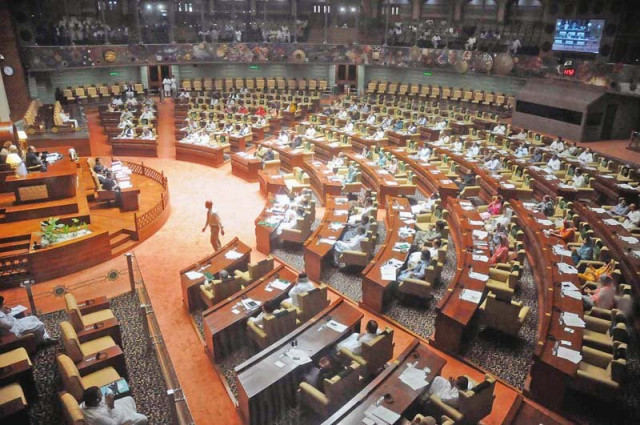Sindh Assembly passes Rs1.21 trillion budget
All expenditure is necessary and there is no need to reduce even a single penny, says CM

Sindh Assembly. PHOTO: FILE
As the session started with Speaker Agha Siraj Durrani in the chair, Chief Minister Syed Murad Ali Shah, who also holds the portfolio of the finance department, moved the budget. The opposition members, belonging to Pakistan Tehreek-e-Insaf (PTI), Muttahida Qaumi Movement - Pakistan (MQM-P) and Grand Democratic Alliance (GDA) moved the cut motions to reduce the non-development expenditure, but the chief minister said that all expenditure was necessary and there was no need to reduce even a single penny.
Adeeba Hasan of PTI moving her cut motion said, "The government has allocated Rs738,939,000 for the expenditure of Chief Minister's House and Rs2 million have been reserved for furniture. I request to please reduce it by at least Rs1,000". The CM said that the furniture at CM's House has become old and there is a need to purchase new furniture.
Khwaja Izharul Hasan of MQM-P raised his objection to Rs10,000,000 discretionary grant allocated to the chief minister and asked that a policy be framed on it. He moved a cut motion to reduce Rs100 from the grant. But his motion too was rejected. "These grants are mandatory and can't be reduced," the CM said. After four hours of discussion, the assembly passed all 159 demands of the Sindh government pertaining to the budget and turned down the opposition's pleas to slash some amount.
Sindh Assembly passes prisons reform law
Zero deficit
The 'zero deficit' budget, which was presented on June 14, comprises a total Rs284 billion development portfolio. The amount includes Rs208 billion provincial funds, Rs51 billion foreign project assistance, Rs4.8 billion federal grants and Rs20 billion district funds. The total receipts of the province for the financial year 2019-20 are estimated at Rs1.217 trillion against an estimated expenditure of Rs1.217 trillion.
As federal transfers and grant to offset the losses of abolition of octroi and zila tax (OZT), the province is expected to receive Rs835.375 billion.
The provincial taxes collection estimates stand at Rs288 billion as compared to Rs243 billion in the outgoing year.
Funds allocation
In the budget, the provincial government has increased the salaries and pensions by 15% while the minimum wage has been declared to be Rs17,000.
Sindh government has increased the budget for school education from Rs170.832 billion to Rs178.618 billion in the next financial year, 2019-20. In this respect, Rs15.15 billion have been allocated for development schemes in education. In the budget, the government has abolished the registration and examination fee for all matric and intermediate boards in Sindh and announced scholarships for students securing grade A-1.
The current revenue expenditure of health department, excluding medical education, has been significantly increased by 19% from Rs96.8 billion in 2018-19 to Rs114.4 billion. However, the development budget of health for 2019-20 is similar to the outgoing year at Rs13.5 billion.
For law and order, the Sindh government has increased non-development budget from Rs100.483 billion in 2018-19 to Rs109.788 billion in 2019-20. It has also announced to appoint 3,000 additional cops.
'Zero deficit' in Rs1.21 trillion Sindh budget
A programme for poverty reduction, as pledged by Pakistan Peoples Party (PPP) Chairperson Bilawal Bhutto Zardari in his election campaign, has also been unveiled. In this programme, the first priority, in terms of budgetary allocation, has been given to education, followed by health and law and order. Around 6,000 jobs have been announced in police and other departments.
Sindh has allocated Rs12.3 billion for social protection and poverty reduction programme in the development budget. Under this, three major interventions are in focus - the Peoples Poverty Reduction Programme (PPRP), Poverty Reduction Strategy (PRS) and Social Protection. The allocation for the energy sector has been increased in the non-development budget from Rs23.883 billion in 2018-19 to Rs24.920 billion in 2019-20.
For the coming financial year, the Sindh government has earmarked Rs40.59 billion for the Karachi package.
Published in The Express Tribune, June 27th, 2019.

1724319076-0/Untitled-design-(5)1724319076-0-208x130.webp)

















COMMENTS
Comments are moderated and generally will be posted if they are on-topic and not abusive.
For more information, please see our Comments FAQ